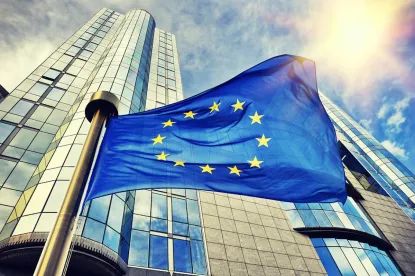ANTITRUST AND COMPETITION
Commission Adopted the Revised Informal Guidance Notice for Novel or Unresolved Competition Issues
Following a public consultation, the European Commission (Commission) published on 3 October 2022 its Notice on Informal Guidance concerning the application of Articles 101 and 102 of the Treaty on the Functioning of the European Union (Revised Informal Guidance Notice).
Pursuant to the European Union (EU) Regulation no. 1/2003, companies can seek informal guidance from the Commission in cases of genuine uncertainty characterised by novel or unresolved questions for the application of EU competition rules. In 2004, the Commission adopted the first informal guidance notice which has been rarely relied upon by companies since it was adopted.
Under the Revised Informal Guidance Notice, companies can ask the Commission to issue an informal guidance letter if: (i) this is compatible with the Commission’s enforcement priorities; (ii) based on a prima facie assessment, the request relates to novel or unresolved questions in EU competition law; and (iii) there is a public interest in providing guidance.
Companies seeking the Commission’s guidance must demonstrate the lack of clarity under EU competition law and any publicly available guidance at the EU level, as well as the legal benefit of the request. The Revised Informal Guidance Notice provides that the Commission will not answer any hypothetical request and will only issue a guidance letter if the agreement or the practice has reached a sufficiently advanced stage of implementation. The Commission’s guidance letter will be published on its website but in a non-confidential version that will redact the companies’ business secrets.
In an effort to enhance this process and make it more attractive, the Revised Informal Guidance Notice has clarified that the Commission will not impose fines on companies that have relied in “good faith” on the guidance letter. Also, the Revised Informal Guidance Notice has streamlined the process by introducing an informal pre-application stage and has broadened the concept of “novel” issues to cover cases where there would be “no sufficient clarification.”
While these improvements are expected to encourage companies to seek informal guidance on the application of EU competition rules, the Commission’s guidance letters are non-binding and do not create any rights or obligations for the applicants or any third party. The Revised Informal Guidance Notice is designed to help companies act in accordance with EU competition rules by enabling them to carry out an informed self-assessment of their agreement or conduct.
DIGITAL AFFAIRS
Commission Proposes Modernisation of EU Liability Legislation
On 28 September 2022, the Commission published two legislative proposals to adapt liability rules to the fast-changing digital world.
In its first proposal, a Directive on Liability for Defective Products, the Commission tabled a modernisation of the existing rules on the strict liability of manufacturers for defective products, including smart technology. Among the changes, the proposed directive will allow for compensation when defective products cause damage when digital products are made unsafe by software updates or when manufacturers fail to address cybersecurity vulnerabilities.
The second legislative proposal, an Artificial Intelligence (AI) Liability Directive, would include a targeted harmonization of national liability rules for AI. The proposal would apply to all AI systems. Like the Directive on Liability for Defective Products, the AI Liability Directive would facilitate the compensation of compensation of individuals who are harmed by AI products or services.
The new rules will enforce the same level of protection for AI-related damages as for non-AI damages. Individuals will be able to challenge a provider, developer, or user of AI technology if they suffer injury to their health or property. Injured persons also can bring a claim if they suffer discrimination based on fundamental rights, such as privacy. Under the rebuttable “presumption of causality,” the court will be able to presume, where a causal link with the AI performance is reasonably likely, that non-compliance with the AI Liability Directive is the cause of the claimed injury. Injured persons will also be able to ask the court to order disclosure of information about high-risk AI systems.
The Commission's proposals will now be amended and negotiated by the European Parliament and the Council of the EU.
The Commission’s EU Action Plan to Digitalise the Energy System
On 18 October 2022, the Commission published an action plan to digitalise the European energy system to facilitate the EU’s so-called twin green and digital transitions (Action Plan). The Action Plan sets out planned initiatives that involve the information and communication technology sector, and in particular, data centres, to make data centres climate neutral and energy and resource efficient by 2030.
Depending on the technical advice received from the European Financial Reporting Advisory Group (EFRAG), the EU may introduce separate reporting lines for indirect greenhouse gas emissions stemming from the purchase of cloud computing and data centre services in the EU’s sustainability reporting standards envisaged by the Corporate Sustainability Reporting Directive. EFRAG is tasked with refining the reporting standards. Additionally, the Commission is planning to alter the requirements of operating conditions of servers and data storage products, such as maximum temperatures that impact the energy consumption of cooling systems. Also, a revision of the ecodesign rules for servers and data storage products (Regulation (EU) 2019/424) may result in the introduction of energy labels for servers and data storage products.
Notably, the Action Plan incorporates the development of a data centre environmental-labelling scheme by 2025 as proposed in the review of the Energy Efficiency Directive, which would include the effectiveness of cooling systems, energy consumption, water consumption, and waste heat reuse. In that vein, the Commission is launching a study at the end of 2022 that will focus on the optimization of data centre integration in the energy and water systems.
A reoccurring theme of the Action Plan is the reuse of waste heat from data centres to heat homes and businesses. The concept is part of the revised Energy Efficiency Directive and Renewable Energy Directive. The two proposals have already introduced provisions to promote reuse of waste heat, which will require research and innovation (R&I) funding for systems that can store waste heat produced by data centres. Such waste heat reuse can defray costs and carbon emissions. The industry’s continued participation in waste heat reuse initiatives and R&I for waste heat storage systems supports the view that data centres have a role in achieving ambitious climate goals while meeting their digital objectives.
ECONOMIC AND FINANCIAL AFFAIRS
The FSB Put Forward a Proposal for a Framework for the International Regulation of Crypto-Asset Activities
On 11 October 2022, the Financial Stability Board (FSB) proposed a framework for the International Regulation of Crypto-asset Activities, ahead of the G20 Finance Ministers and Governors of Central Banks meetings held in Washington, D.C.
The FSB underlines the need for an effective regulatory framework for crypto-asset activities that presents comprehensive rules commensurate to the risks crypto-assets pose to financial activities, while still protecting their technological innovation.
The FSB proposes in its framework to follow the principle “same activity, same risk, same regulation” whereby crypto-asset activities are subject to equivalent regulatory obligations as traditional financial activities when the risk they pose is similar. For novel risks created by crypto-assets, it is proposed to create new guidance or specific regulation.
Furthermore, the FSB stresses that stablecoins widely used as means of payment and/or stores of value should be subject to higher regulatory standards, including in relation to availability of legal claims for users, stability of value, and redemption guarantees.
The FSB also calls on the relevant authorities, consistent with their mandates, to have the capacity to identify and monitor links between the crypto-asset ecosystem and the traditional financial system as well as to internationally cooperate with foreign counterparts to identify and assess cross-border spill overs and risks.
Within the proposed framework, the FSB presents (i) policy recommendations for the regulation, supervision, and oversight of crypto-asset activities and markets that aim for a comprehensive and more consistent international regulatory and supervisory approach to crypto-asset activities and markets; and (ii) a revision of the FSB’s High-level Recommendations for Global Stablecoin Arrangements, originally presented in October 2020. The new recommendations, which the FSB considers flexible enough to be incorporated in the variety of regulatory frameworks applicable to global stablecoins internationally, provides guidance to reinforce the governance framework, setting out responsibilities for stablecoins issuers and providers, and requiring them to provide robust legal claim, guarantee timely redemption at par into fiat, and maintain effective stabilisation mechanisms amongst other suggestions.
G20 Finance Ministers and Central Bank Governors welcomed the ongoing work by the FSB in the crypto-assets space and its proposed approach for a comprehensive international framework for the regulation of crypto-asset activities based on the principle of ‘same activity, same risk, same regulation’.
All published documents are open to public consultation until 15 December 2022.
ESMA Sets Out its Strategic Priorities for the Next Five Years
On 10 October 2022, the European Securities and Markets Authorities (ESMA) published its strategy for 2023-2028. The strategy focuses on the key financial services priorities of the EU and aims to tackle the most significant risks currently affecting European financial markets, through three strategic priorities and two thematic drivers.
The first strategic priority -- “fostering effective markets and financial stability” -- reflects the active support provided by ESMA to the deepening of an integrated European Capital Markets Union (CMU) and aims to put the Commission’s CMU Action Plan in the frontline of ESMA’s priorities. For this purpose, ESMA will focus on ensuring fair, orderly, and effective markets, contributing to strengthening the stability of the financial system, developing the EU Single Market, and continuing to engage with international standard-setters.
Regarding its second strategic priority, ESMA wants to “strengthen the supervision of EU financial markets” in order to create synergies between the competences and responsibilities allocated to the National Competent Authorities (NCAs) and those allocated to ESMA. The European regulator aims to achieve a common EU supervisory culture, risk prioritisation, and the convergence of supervision approaches and outcomes.
The third strategic priority focuses on “enhancing protection of retail investors.” ESMA and the NCAs want to ensure investors are effectively protected, particularly retail investors. ESMA’s objective is to continue developing retail investor trend monitoring and analysis and concentrate on protecting them from risks, such as new and innovative products or services (e.g., crypto-assets).
In terms of thematic drivers, ESMA will focus on “enabling sustainable finance” and “facilitating technological innovation and effective use of data.” For the first one, ESMA aims to keep focusing on the goals presented in the Sustainable Finance Roadmap and support the sustainable transition by taking a holistic view across the sustainable investment value chain. As for technology innovation, ESMA will seek to ensure that financial regulation does not obstruct innovation, while still maintaining a level playing field between emerging players and products, and more traditional ones.
TRANSPORT
The 2022 European Aviation Environmental Report
On 21 September 2022, the EU Aviation Safety Agency, with the support from the European Environment Agency and EUROCONTROL published the 2022 edition of the European Aviation Environmental Report 2022 (Report).
The Report provides an overview of the environmental performance and progress made by the European aviation industry in the last three years. It also gives a range of recommendations on how the level of environmental protection could be improved, with a focus on measures for reducing climate change, noise, and air quality impacts.
The report shows that Europe has taken actions in recent years, but also that further work is needed, especially as the aviation sector is projected to grow substantially and, like all other transport modes, is expected to contribute to a climate-neutral future by 2050. In fact, while the pandemic caused a drop in the number of flights from 9.3 million in 2019 to 4.12 million in 2020 and 5.07 million in 2021, long-term trends suggest that the European region may record more than 12 million annual flights by 2050. This expected increase in the annual number of flights will be accompanied by a rise in aircraft CO2 emissions, estimated at 188 million tons, unless environmental protection measures are prioritised.
The recommendations included in the Report aim to: (i) improve the level of environmental protection in civil aviation; (ii) assist the EU in ensuring that the aviation sector contributes to the objectives of the European Green Deal; (iii) incentivise airspace users to fly trajectories with less environmental impact, in line with the Single European Sky, incentivising the uptake of sustainable aviation fuels; (iv) foster green airport operations and infrastructure; (v) integrate effective environmental measures into the European Air Traffic Management system; (vi) promote research to identify solutions to environment and climate impacts as well as to build climate change resilience; (vii) promote investments and Market Based Measures to enhance the sustainability; and (viii) incentivise technological innovation through continued international cooperation on regulatory standards.
Joanna Kulewska, Matilde Manzi, Stefano Prinzivalli Castelli, Vittoriana Todisco, and Philip Torbøl also contributed to this article.







 />i
/>i

